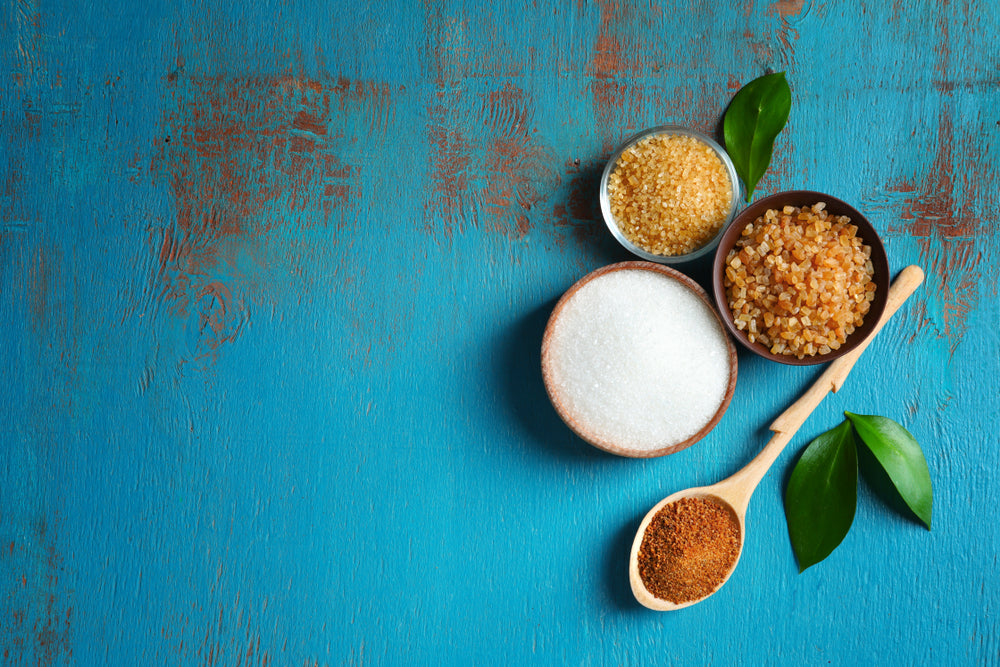
We've all heard the buzz — too much sugar is as good for us as a sandstorm at a beach party. Does that mean we're obliged to ax all sweet treats from our menus? For those of us with a sweet tooth, that's a less-than-tasty prospect.
Let's break it down: sugar itself isn't the bad guy. After all, some of the most nutrient-rich superfood fruits contain naturally occurring sugar, which is found alongside nutrients like fiber, which impact how our body processes the sugar. But an all-you-can-eat sugar buffet? And sugar added to countless foods? That's the real health mischief-maker. Like most things in life, too much of a good thing can be bad news.
It's also crucial to think about the type of sugar we're spooning into our meals. This is where the word "natural" steps into the limelight. As it turns out, certain artificial sweeteners like aspartame or sucralose could be party poopers on the health front.
Cue the entrance of coconut sugar, a natural sweetener that's been making quite a splash lately. Stick with us as we dive into its sweet benefits and how it squares up against other sugars.

What Is Coconut Sugar?
Contrary to what its name might imply, coconut sugar, or coconut palm sugar, isn't whipped up from coconuts. Rather, it's produced from the sap of the coconut palm tree, a botanical old-timer, believed to be one of the earliest flowering plants in the world.
After making a name for itself in South and Southeast Asia, coconut sugar has made its global debut.
At first blush, coconut sugar might remind you of brown sugar, but look closer, and you'll find it's less glossy-looking. Its nutritional rap sheet also sets it apart from the refined white table sugar we're used to. Beyond just calories, coconut sugar boasts a range of minerals, vitamins, and fiber.
Making coconut sugar is pretty straightforward:
- Sap is collected from the flower bud of coconut trees.
- The sap is simmered down to concentrate the sugars.
- The sugars are then packaged and sold in a form similar to other sugars.

What Is Refined Sugar?
Sugar is a natural part of pretty much all fruits and veggies we eat — when this natural sugar is extracted and processed, and the resulting syrupy molasses is removed, we end up with the pristine, crystalline, pantry-staple we know as table sugar.
The sugar we usually consume at home is squeezed out of sugarcane or sugar beets. They're chopped and soaked in hot water to squeeze out their sweet juice. The juice is then filtered into a syrup that crystallizes into those familiar sweet nuggets.
Another infamous member of the refined sugar family is high fructose corn syrup. To concoct this syrup, manufacturers mill corn into corn starch, process it into corn syrup, and then tweak it to increase the fructose and up the sweetness.
Most refined sugars, including table sugar and high fructose corn syrup, are tagged as "empty calories" because they offer no vitamins, minerals, or other nutrients. In fact, studies have shown that these refined sugars are tied to metabolic abnormalities, fueling obesity and cardiovascular disease worldwide.
What Are the Benefits of Coconut Sugar?
While refined sugar does a stellar job at being, well, sweet, it's pretty much just a one-trick pony delivering empty calories. Coconut sugar, on the other hand, is a refined sugar alternative with more to boast about than just its tantalizing, caramel-like taste. Its nutrient roster includes the likes of potassium, magnesium, zinc, and iron, not to mention a cool quartet of vitamins B1, B2, B3, and B6.
Coconut sugar doesn't stop there! It contains essential amino acids, those nifty little things your body needs for protein synthesis. Picture this: coconut sugar brings its game with six times more protein than cane sugar.
You know how dietary fiber is the best friend of a happy gut? Well, coconut sugar is rocking a prebiotic fiber entourage with 4.6 grams of inulin per 100 grams. Inulin not only boosts gut health, but this fiber superstar also aids mineral absorption.
Pro Tip: to keep your fiber intake up to par, have a whirl at our Perfect Smoothie Formula.
Let's not forget about coconut sugar's rumored antioxidant prowess. This could help keep your cells doing what they’re supposed to. Fun fact: the darker the coconut sugar, the higher its antioxidant activity. So, a deeper tan could mean more antioxidant mojo!

Is Coconut Sugar Better Than Other Natural Sweeteners?
Now for the juicy question that's probably been nibbling at you: is coconut sugar better for you than other natural sweeteners? We've engaged with the topic of how it stacks up against refined white sugar, but let's delve deeper and see how coconut sugar compares to other sweet heavyweights like cane sugar, brown sugar, maple syrup, and honey.

Cane Sugar
The white sugar sitting on your countertop likely hails from either sugar beets or sugarcane, with the latter being the birthplace of the cane sugar we all know. It's the sugary staple of our beloved desserts, sauces, and more.
However, as nice as it is to have cane sugar around, it doesn't bring much to the table — no noteworthy nutrients and in excess, and it's likely to dent our health.
Per teaspoon, cane sugar brings:
- 15 calories
- 4 grams of carbs
- 4.2 grams of sugar
- Zero in the fat, protein, fiber, or sodium department

Brown Sugar
Brown sugar is crafted much like table sugar. After extracting and refining sugarcane into white sugar, molasses is added back in to create those deep, caramel-hued granules we love.
Aside from lending its yummy sweetness to our treats, and adding a flavor kick to nutritious foods, like oatmeal, the health benefits of brown sugar remain nil.
Per teaspoon, brown sugar dishes out:
- 17 calories
- 1 mg sodium
- 4.51 grams of carbohydrates
- 4.46 grams of sugar
- Basically nothing in the fat, protein, or fiber category

Maple Syrup
Just like coconut sugar, maple syrup hails from tree sap. However, instead of tropical palm trees, it's the sugar of black maple trees that are tapped to gift us this heavenly nectar.
As a proud North American native, maple syrup doesn't just offer a deluge of sweetness; it also provides antioxidants and a medley of beneficial minerals, including:
- Potassium
- Calcium
- Manganese
- Copper
- Magnesium
- Zinc
One crucial caveat: maple syrup lacks coconut sugar's fiber sidekick, which is instrumental in counteracting the blood sugar-spiking effect. So, for the blood sugar conscious among us, it might not be the go-to syrup of choice.
Per teaspoon, maple syrup pours out:
- 52 calories
- 13 grams of carbs
- 12 grams of sugar
- 0 in the protein, fat, or fiber department

Honey
Last on our sweet lineup is honey. Bees do more than just busily buzz around keeping our ecosystem humming along; they also provide us with the golden ambrosia that is honey, which they produce from the nectar secreted from various flowers.
The supermarket shelf will offer a swarm of honey varieties. Raw honey is the unprocessed star straight from the hive, whereas most large-scale producers will pasteurize and filter the honey before it graces your shopping cart, zapping out most of its health benefits.
Research suggests that honey bolsters the body's antioxidant levels, and it even shows promise in supporting balanced blood sugar and cholesterol levels.
Raw honey is also known to be largely beneficial thanks to its plentiful phytochemicals (chemical compounds found in plants). These compounds, which offer antioxidant, anti-inflammatory and antiviral properties, are even known to work synergistically, joining forces to heighten the beneficial effects — but it doesn’t end there.
Honey also contains proteins, enzymes, amino acids, and minerals — all things that refined sugar just doesn’t bring to the table.
Per teaspoon, honey dishes out:
- 63.8 calories
- 17.3 grams of carbohydrates
- 17.3 grams of sugar
- 1 mg sodium
- Barely a trace of protein, fat, or fiber
The Bottom Line
Here's the thing: based on your personal health aspirations, coconut sugar might just edge out other natural sweeteners. Though the differences might be minuscule, it gets the upper hand over cane and brown sugar, thanks to its impressive array of nutrients, setting it apart from the dreaded "empty calories."
However, coconut sugar might not have the same robust research backing that honey and maple syrup enjoy. This is where personal requirements come into the picture. If weight loss or maintenance is your focus, then coconut sugar, with its fewer calories, may be your sweet sidekick.
That said, let's be real: coconut sugar is, at its core, still sugar. While it parades potential health benefits and makes a splendid table sugar substitute, it hasn't quite earned its stripes as a "health food," so use it wisely.
The safest bet to avoid the sugar blues? Stick to foods sans added sugar. But when you do yield to a scrumptious homemade cake or a batch of irresistible chocolate chip cookies, why not pick coconut sugar for your team?
Hungry for more nutritious nibbles? Embark on a wellness exploration with more articles like these on The JOYÀ Life Blog right here.
